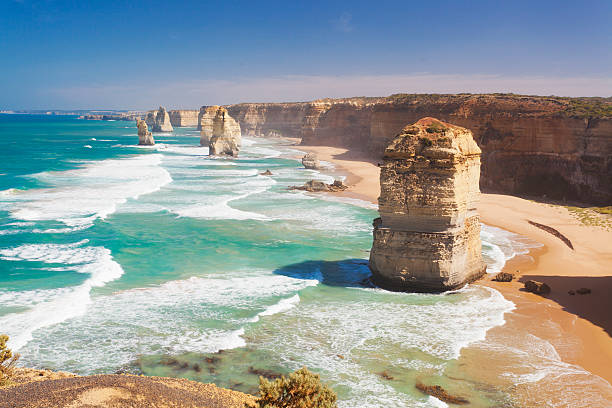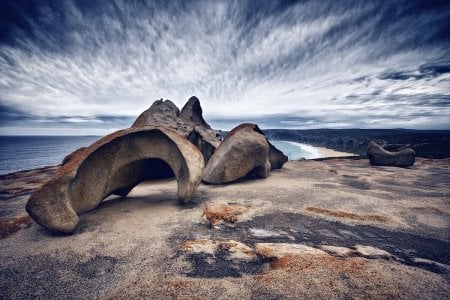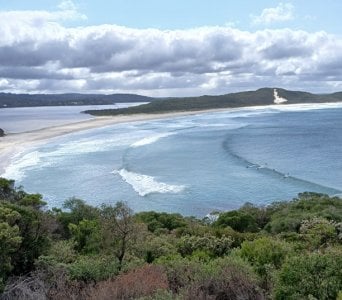
Every day, thousands of visitors flock to Australia's most photographed stretch of coastline, camera phones at the ready to capture the iconic limestone stacks that have become synonymous with Victoria's Great Ocean Road.
But behind the picture-perfect facade lies a mounting challenge that's prompting tourism officials to consider something once unthinkable—charging people to witness one of our nation's natural wonders.
The Great Ocean Road recorded approximately 6.8 million total visitors in 2024, about 92 per cent of the pre-pandemic peak. Of these, around two million make the pilgrimage specifically to see the Twelve Apostles, creating what some describe as a daily convoy of cars and tour buses along the narrow coastal road.
The numbers don't lie
Great Ocean Road Regional Tourism (GORRT) and Corangamite Shire aren't pulling this idea out of thin air. They're responding to what they call a 'once-in-a-generation' opportunity to implement sustainable tourism practices before the pressure becomes unbearable.
Convoys of cars and tourist buses take to the narrow length of road to the Twelve Apostles every single day. The result? Overcrowded car parks and a natural environment under increasing strain.
'As stewards of the visitor economy in this extraordinary region, we believe a thoughtfully introduced user-pays system is not only fair, it is essential'
The environmental reality is stark. Port Campbell National Park, the home of the Twelve Apostles, is for most of its extent a very narrow coastal strip of land between 150 metres and 700 metres wide.
This fragile ribbon of coastline simply wasn't designed to handle millions of visitors annually.
Learning from the world's pioneers
Victoria wouldn't be breaking new ground here. Across the globe, destinations are discovering that charging tourists can actually improve their experience while protecting precious environments.
Venice is committing to its pioneering tourist entry fees, expanding the program to 54 days in 2025 after a successful trial run this year. 'The experiment worked, and now we can move forward by maintaining the period but increasing the days,' said Venice Mayor Luigi Brugnaro.
Tourist fees around the world
Venice: €5 for day-trippers on busy days
New Zealand: $100 international visitor levy
Bali: $10 arrival fee
Bhutan: $100 per day
Iceland: Tourist tax being introduced in 2024
New Zealand's International Visitor Levy almost tripled from NZ$35 to $100 following a review in 2024. The resulting fund is intended to support the development of much needed tourism infrastructure in regions with high visitor-to-resident ratios, and to help support conservation initiatives.
What you could expect to pay
While the tourism board hasn't revealed specific fee amounts, their proposal suggests a tiered system that would reward smart travel choices.
The plan explicitly mentions incentives for overnight stays and off-peak visits—potentially meaning cheaper or free access for those willing to avoid the morning rush.
Visit the Twelve Apostles, for example, in the early morning or late afternoon and they're practically empty apart from little penguins flip-flapping to or from the sea back to their beachside burrows.
The proposed fees would help fund a massive $126 million investment in the Twelve Apostles Precinct, including a new visitor centre.
Recent improvements are already underway—there is a new $9.2 million viewing platform that opened in mid 2024 that extends over a cliff to provide a panoramic view of The Apostles.
What this could mean for your visit
- Fees likely to vary by season and time of day
- Overnight stays may receive discounts or exemptions
- Revenue to fund better facilities and conservation
- Potential for improved crowd management
- Enhanced visitor experience with less overcrowding
The bigger picture
This isn't just about money—it's about preserving one of Australia's most treasured landscapes for future generations. This grand old centurion is suffering. The narrow coastal environment faces pressure from multiple directions, and tourism officials are looking for solutions that balance access with protection.
Due to ongoing construction works at the Twelve Apostles Visitor Centre, significant changes to access and parking arrangements are already in effect. All visitors are asked to plan ahead and be patient when travelling to the site during busy periods.
A strategic shift
The proposal reflects a fundamental change in how Australia approaches tourism management. Rather than simply trying to attract more visitors, the focus is shifting towards creating sustainable, quality experiences that benefit both tourists and local communities.
Did you know?
Did you know?
The Great Ocean Road experiences some of the highest visitor-to-resident ratios in Australia, with many small coastal towns seeing their populations multiply during peak periods, placing enormous strain on local infrastructure and services.
GORRT general manager Liz Price emphasises that this is about more than managing crowds: 'The Great Ocean Road is more than a scenic drive—it's a living, working region filled with vibrant communities, remarkable landscapes, and cultural depth. It's time we aligned our tourism management with our values—sustainability, responsibility, and long-term community benefit.'
Planning your visit
While we wait for the Victorian government's decision, there are still ways to enjoy the Twelve Apostles without contributing to the crowd problem. Early morning or late afternoon visits offer practically empty viewing areas, plus you'll have the bonus of witnessing the limestone stacks in golden light that photographers prize.
The tourism board's vision includes active management of visitation across different times of day and year, encouraging overnight stays in the region rather than day trips from Melbourne. This approach could actually enhance your experience while reducing environmental impact.
What This Means For You
The proposal now rests with the Victorian government, who face the challenge of balancing public access to natural wonders with the pressing need for environmental protection and sustainable tourism management. Whatever they decide will likely set a precedent for how Australia manages its most beloved tourist destinations in an era of growing environmental awareness.
For now, the Twelve Apostles remain free to visit, but the writing may well be on the (limestone) wall. The question isn't whether change is coming, but how quickly we can adapt our travel habits to ensure these magnificent formations remain standing for generations to come.
What are your thoughts on charging fees to visit natural attractions? Have you experienced similar systems overseas, and do you think they enhanced or detracted from your visit? Share your experiences and opinions below.
Original Article
https://www.9news.com.au/national/t...victoria/a89c04f8-8994-4afb-b8ef-5af55a7c9116
Great Ocean Road & 12 Apostles Tourism Statistics | 2024
Cited text: The Great Ocean Road recorded approximately 6.8 million total visitors in 2024, about 92 per cent of the pre-pandemic peak.
Excerpt: The Great Ocean Road recorded approximately 6.8 million total visitors in 2024, about 92 per cent of the pre-pandemic peak.
https://roadgenius.com.au/statistics/tourism/australia/great-ocean-road-12-apostles/
Responsible tourism on the Great Ocean Road
Cited text: Convoys of cars and tourist buses take to the narrow length of road to the Twelve Apostles every single day.
Excerpt: Convoys of cars and tourist buses take to the narrow length of road to the Twelve Apostles every single day.
https://www.responsibletravel.com/h...guide/flora-and-fauna-of-the-great-ocean-road
Responsible tourism on the Great Ocean Road
Cited text: From climate change to farmers, day trippers to overcrowded car parks, Aboriginal land owners to high rise hoteliers, the issues facing the Great Ocea...
Excerpt: Overcrowded car parks
https://www.responsibletravel.com/h...guide/flora-and-fauna-of-the-great-ocean-road
Great Ocean Road threatened? - Victorian National Parks AssociationVictorian National Parks Association
Cited text: Port Campbell National Park, the home of the Twelve Apostles, is for most of its extent a very narrow coastal strip of land between 150 metres and 700...
Excerpt: Port Campbell National Park, the home of the Twelve Apostles, is for most of its extent a very narrow coastal strip of land between 150 metres and 700 metres wide.
https://vnpa.org.au/great-ocean-road-threatened/
Venice to Charge Tourist Entry Fees on 54 Days in 2025
Cited text: Venice is committing to its pioneering tourist entry fees, expanding the program to 54 days in 2025 after a successful trial run this year. “The exper...
Excerpt: Venice is committing to its pioneering tourist entry fees, expanding the program to 54 days in 2025 after a successful trial run this year.
https://skift.com/2024/10/25/venice-to-charge-entry-fees-more-often-the-experiment-worked/
Tourist trap: why charging entry fees at iconic NZ natural attractions could have hidden costs
Cited text: The IVL—paid at the border by a majority of non-residents arriving from overseas—almost tripled from NZ$35 to $100 following a review in 2024. The...
Excerpt: New Zealand's International Visitor Levy almost tripled from NZ$35 to $100 following a review in 2024.
https://theconversation.com/tourist...al-attractions-could-have-hidden-costs-263609
Responsible tourism on the Great Ocean Road
Cited text: Visit the Twelve Apostles, for example, in the early morning or late afternoon and theyre practically empty apart from little penguins flip-flapping ...
Excerpt: Visit the Twelve Apostles, for example, in the early morning or late afternoon and they're practically empty apart from little penguins flip-flapping to or from the sea back to their beachside burrows.
https://www.responsibletravel.com/h...guide/flora-and-fauna-of-the-great-ocean-road
The Twelve Apostles (2025) - All You Need to Know BEFORE You Go (with Reviews & Photos)
Cited text: There is a new $9.2 million viewing platform that opened in mid 2024 that extends over a cliff to provide a panoramic view of The Apostles.
Excerpt: there is a new $9.2 million viewing platform that opened in mid 2024 that extends over a cliff to provide a panoramic view of The Apostles.
https://www.tripadvisor.com/Attract...e_Twelve_Apostles-Port_Campbell_Victoria.html
Responsible tourism on the Great Ocean Road
Cited text: This grand old centurion is suffering.
Excerpt: This grand old centurion is suffering.
https://www.responsibletravel.com/h...guide/flora-and-fauna-of-the-great-ocean-road
Twelve Apostles
Cited text: Due to ongoing construction works at the Twelve Apostles Visitor Centre, significant changes to access and parking arrangements will be in effect from...
Excerpt: Due to ongoing construction works at the Twelve Apostles Visitor Centre, significant changes to access and parking arrangements are already in effect.
https://www.parks.vic.gov.au/places...ll-national-park/things-to-do/twelve-apostles









